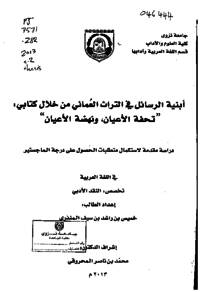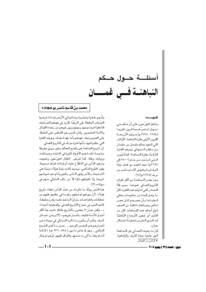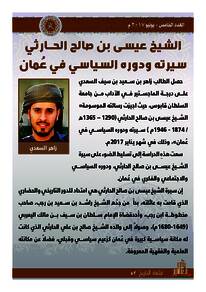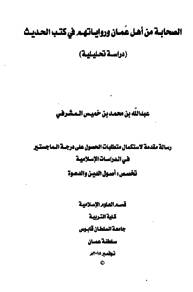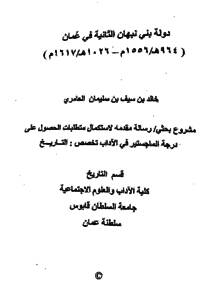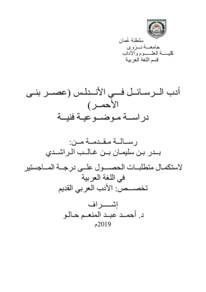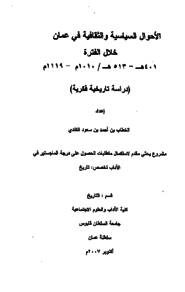Document
الرسائل العمانية من القرن الثالث حتى القرن التاسع هجرياً : بحث في القيم الحضارية
Publisher
جامعة السلطان قابوس
Gregorian
2018
Language
Arabic
English abstract
The Sultanate of Oman occupies a strategic geographical location overlooking some international trade water routes and serves as a linking point between the East and West as well as the countries on the shores of the Indian Ocean and the Arabian Gulf. This unique position enabled the Omani people, over the centuries, to communicate and interact with other nations and civilizations and create their own civilization that reciprocally influences and becomes influenced by the surrounding global events. With the advent of Islam, the Omani people embraced the Islamic faith based on solid knowledge and understanding of religion and transformed their civilization into a shining model that was established on the principles and tenets of Islam. Also, their day-to-day life and interactions were governed by Islamic . code of behavior and, -hence, the emergence of a unique Arabic and Islamic civilizational heritage. This paper will discuss a key aspect of this heritage.
This research aims to review the civilizational values of Omani society by shedding light on Omani biographies (letters) exchanged during the third and ninth centuries in the Hijri calendar. I also traced the defining features of the Omani people in the context of establishing their own system of governance as established by the Islamic civilization, the role played by scholars and their reformative efforts to bridge the gap between the ruling authority and the society and how they endeavored to set the mechanisms and approaches to address the various challenges that impacted the Omani society. To reach this conclusion, the research is divided into an introduction, four sections and conclusion. In section one, the themes and tools of the research where the commentaries, the explanations, the sources and references of the research are cited were discussed. In the same section, I also highlighted the temporal and spatial frameworks, provided elaborate definitions to the most important terms and reviewed the evolution of the writing techniques.
In section two, I turned to the description of the commentaries through tabulation that enabled us to categorize the letters and illustrate their established foundations thus creating a methodological scientific guide to serve as a substitute for the letters. As a result of the categorization, polythematic issues were identified including political, social and military dimensions.
Section three featured the technical and aesthetics aspects of the letters where the views of the authors of letters with political, social and military contents were discussed. Moreover, the civilizational values were further analyzed, and I swerved to the dogmatic views and literary proclivities of the authors and in what fashion these values influenced the social life in Oman. Generally, section three addressed three themes.
Section four is devoted to discussing and analyzing the writing styles in terms of the technical structure of texts, intertextuality and its employment within the texts in addition to analyzing the prominent literary manifestations in the texts.
· In the conclusion, I came up with numerous findings that I hope will open the door wide for further
studies on Omani heritage and thus help to enrich an already impoverished Arabian library. Our study revealed several important issues respective of the Omani civilization and they remain receptible to more scholarly studies and research that may identify the foundations of the Omani heritage and its expansive epistemic domains and civilizational values due to the otherwise missing information in the resources so far available to us.
Arabic abstract
تشغل همان موقعا جغرافيا ذا أهمية إستراتيجية في قديم الزمان وحاضره، إذ تشرف على ممرات بحرية تجارية عالمية، وتمثل نقطة اتصال بين الشرق والغرب والدول المطلة على المحيط الهندي وبحر العرب. إن هذا الموقع المتميز أتاح للشعب العماني التواصل مع الأمم والحضارات على مر العصور، واستطاع من خلال تفاعله معها أن يكون حضارة خاصة به تؤثر وتتأثر بمجريات محيطها العالمي. وعند مجيء الإسلام اعتنقه العمانيون عن علم وبصيرة، وحولوا حضارتهم السابقة إلى حضارة إسلامية، بنوها على مبادئ الدين الإسلامي وطبقوا شريعته في حياتهم اليومية وتعاملاتهم المختلفة، فأفرزت إرثا حضاريا عرينيا إسلاميا، نحن بصدد مناقشة إحدى جزئياته في هذا البحث.
ونهدف من وراء هذا البحث دراسة القيم الحضارية من خلال السير (الرسائل العمانية التي حصرناها بين القرن الثالث والقرن التاسع هجرا، وقد تتبعنا السمات المميزة التي تفردت بها المدرسة الإباضية في إقامة نظام الحكم كما قعدته الحضارة الإسلامية من وجهة النظر الإباضية، ودور العلماء ونشاطهم الإصلاحي الرابط بين السلطة والمجتمع، ومعرفة الآليات والوسائل التي اتبعت في معالجة القضايا المختلفة ومدى تأثيرها في مسيرة المجتمع العماني. وللوصول إلى هذه الغاية اقتضت منهجية البحث تقسيمه إلى مقدمة وأربعة فصول وخاتمة. ففي الفصل الأول ناقشنا إطار البحث وأدواته، إذ بينا فيه تكوين مدونة البحث وحيثياتها، ورصدنا مصادر البحث ومراجعة، وتطرقنا إلى الدراسات السابقة، وحتينا الإطار الزمني والمكاني، وعرقنا أهم المصطلحات الواردة في البحث، ووقفنا على تطور أساليب الكتابة.
وقدمنا في الفصل الثاني توصيفا للمدونة من خلال جدولة مكنتنا من تأطير الرسائل وبيان الأركان القارة التي قامت عليها، وجعلناها بمثابة دليل علمي ومنهجي في مقام البديل للرسائل، وتضمن ثلاثة مباحث حسب تصنيفنا سياسية واجتماعية. فعسكرية. واشتمل الفصل الثالث على مضمونات القول، ناقشنا فيه آراء كتاب الرسائل السياسية والاجتماعية والعسكرية، وحللنا القيم الحضارية ونظرة كتاب النصوص إليها من الناحية العقدية والنزعات الفكرية ومدى تأثيرها في حياة المجتمع العماني، ووزعنا مادة الفصل في ثلاثة مباحث. أما الفصل الرابع فخصصناه لمناقشة أساليب الكتابة في ثلاثة مباحث، من حيث البناء الفتي الرسائل، وناقشنا ظاهرة التناص وتوظيفها ضمن النصوص، وحللنا الظواهر الأدبية البارزة فيها.
وخلصنا في خاتمة البحث إلى جملة من النتائج نرجو أن تساهم في فتح آفاق إضافية لدراسة التراث العماني، وتسد ثلمة في المكتبة العربية. وكذلك توصلنا في دراستنا إلى مجموعة من القضايا نرى أنها ذات أهمية في الحضارة العمانية، وتبقى قابلة لمزيد من البحث للوصول إلى مكونات التراث العماني وحقوله المعرفية وقيمه الحضارية في ضوء ما تعذر علينا الوصول إليه من الوثائق.
ونهدف من وراء هذا البحث دراسة القيم الحضارية من خلال السير (الرسائل العمانية التي حصرناها بين القرن الثالث والقرن التاسع هجرا، وقد تتبعنا السمات المميزة التي تفردت بها المدرسة الإباضية في إقامة نظام الحكم كما قعدته الحضارة الإسلامية من وجهة النظر الإباضية، ودور العلماء ونشاطهم الإصلاحي الرابط بين السلطة والمجتمع، ومعرفة الآليات والوسائل التي اتبعت في معالجة القضايا المختلفة ومدى تأثيرها في مسيرة المجتمع العماني. وللوصول إلى هذه الغاية اقتضت منهجية البحث تقسيمه إلى مقدمة وأربعة فصول وخاتمة. ففي الفصل الأول ناقشنا إطار البحث وأدواته، إذ بينا فيه تكوين مدونة البحث وحيثياتها، ورصدنا مصادر البحث ومراجعة، وتطرقنا إلى الدراسات السابقة، وحتينا الإطار الزمني والمكاني، وعرقنا أهم المصطلحات الواردة في البحث، ووقفنا على تطور أساليب الكتابة.
وقدمنا في الفصل الثاني توصيفا للمدونة من خلال جدولة مكنتنا من تأطير الرسائل وبيان الأركان القارة التي قامت عليها، وجعلناها بمثابة دليل علمي ومنهجي في مقام البديل للرسائل، وتضمن ثلاثة مباحث حسب تصنيفنا سياسية واجتماعية. فعسكرية. واشتمل الفصل الثالث على مضمونات القول، ناقشنا فيه آراء كتاب الرسائل السياسية والاجتماعية والعسكرية، وحللنا القيم الحضارية ونظرة كتاب النصوص إليها من الناحية العقدية والنزعات الفكرية ومدى تأثيرها في حياة المجتمع العماني، ووزعنا مادة الفصل في ثلاثة مباحث. أما الفصل الرابع فخصصناه لمناقشة أساليب الكتابة في ثلاثة مباحث، من حيث البناء الفتي الرسائل، وناقشنا ظاهرة التناص وتوظيفها ضمن النصوص، وحللنا الظواهر الأدبية البارزة فيها.
وخلصنا في خاتمة البحث إلى جملة من النتائج نرجو أن تساهم في فتح آفاق إضافية لدراسة التراث العماني، وتسد ثلمة في المكتبة العربية. وكذلك توصلنا في دراستنا إلى مجموعة من القضايا نرى أنها ذات أهمية في الحضارة العمانية، وتبقى قابلة لمزيد من البحث للوصول إلى مكونات التراث العماني وحقوله المعرفية وقيمه الحضارية في ضوء ما تعذر علينا الوصول إليه من الوثائق.
Member of
Resource URL
Same Subject
